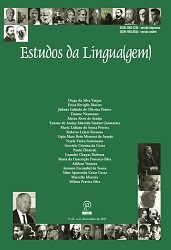The art of translating: translations and the debate on grammar, classical languages, european vernaculars, puritas, writing and literate consuetudo in portugal from the 16th to the 18th centuries
DOI:
https://doi.org/10.22481/el.v15i2.3550Keywords:
Translation, Vernacular grammars, Puritas, Literate custom, ScriptureAbstract
This study aims at understanding two opposite translation practices in the Portuguese Empire among the 16th and the 18th centuries: one supported that the good translation should focus on setting exact lexical equivalences between the original and the translated text – obviously it’s necessary to set the limits that the differences between the source and the target languages impose to the translation act itself, and consider what each translator understands by translation word by word -, and the other which established as its task the determination of equipoises between frasical or oracional unities. As we will try to demonstrate over this study, the diverse translation practices implicate very distinct comprehension of the differential value of the source and target languages, considering that in our corpus the source texts where written in Greek and Latin. In the differential value of the source and target languages it is implied another question: that on the grammatical quarrel about the superiority of the classical languages over the modern ones. Here, we will try to solve this specific set of problems.
Downloads
References
BARROS, J. de. Grammatica da língua Portuguesa. Olyssippone: Apud Lodovicum Rotorigiũ, 1540.
BLUTEAU, D. R. Vocabulario Portuguez & Latino [...]. Authorizado com Exemplos dos Melhores Escriptores Portuguezes, & Latinos, e Offerecido a El-Rey de Portugal Dom João V pelo Padre Dom Rafael Bluteau [...]. Lisboa Occidental: Pascoal da Sylva, tomo VIII, 1721.
BOLGAR, R. R. The Classical Heritage and Its Beneficiaires. Cambridge: Cambridge University Press, 1954.
BUESCU, M. L. C. Gramáticos portugueses do século XVI. Lisboa, Lisboa: Bertrand, Biblioteca Breve, vol. 18, 1978.
CARVALHO, M. do S. F. de. Poesia de agudeza em Portugal. São Paulo: HUmanitas/Edusp, 2007.
CERTEAU, M. de. Montaigne's "Of Cannibals": The Savage "I". In: Heterologies: Discourse on the Other. Minneapolis: University of Minnesota Press, 1986, pp. 67-79.
CHARTIER, R. À beira da falésia. A história entre certezas e inquietude. Porto Alegre: Editora da UFRGS, 2002.
CICERUS. M. T. De inventione; De optimo genere oratorum; Topica. Edited and translated by H. M. Hubbell. Cambridge: Cambridge University Press, Loeb Classical Library, 1949.
CURTIUS, E. R. Literatura europeia e Idade Média Latina. Rio de Janeiro: Instituto Nacional do Livro, 1957.
DOLET, E. La maniere de bien traduire d'une langue en aultre. Lyon: Dolet, 1540.
ESTIENNE, R. Traicte de la grãmaire Francoise. Paris: Robert Estienne, 1557.
GANDAVO, P. de M. de. Regras que ensinam a maneira de escrever e orthographia da lingua Portuguesa, com um Dialogo que adiante se segue em defensam da mesma lingua. Lisboa: Antônio Gonsalves, 1574.
GOODY, J. The Logic of Writing and the Organization of Society. Cambridge: Cambridge University Press, 1996.
HANSEN, J. A. A sátira e o engenho. Gregório de Matos e a Bahia do século XVII. São Paulo: Companhia das Letras, 1989.
______. Agudezas seiscentistas. Floema, Caderno de Teoria e História Literária, 2A, Especial João Adolfo Hansen, p. 85-110, 2006.
______. Anatomia da sátira. In: VIEIRA, B. V. G. & THAMOS, M. Permanência Clássica. Visões contemporâneas da Antiguidade greco romana. São Paulo: Escrituras, p. 145-169, 2011.
KRISTEVA, J. Introdução à semanálise. 2 ed., São Paulo: Perspectiva, 2005.
LEBRIJA, A. Gramática Castellana. Reproduction de l'édition princeps (1492). Publiée avec une préface par E. Walberg. Halle: Max Niemeyer, 1909.
LEITE, M. Q. O Nascimento da Gramática Portuguesa. Uso & Norma. São Paulo: Humanitas/Paulistana, 2007.
OLIVEIRA, F. Grammatica da lingoagem portuguesa. Lisboa: 1536.
ONG, W. J. Latin Language Study as a Renaissance Puberty Rite. Studies in Philology, vol. 56, n° 2, p. 103-124, 1959.
______. Oral Residue in Tudor Prose. PMLA, vol. 80, n° 3, p. 145-154, 1965.
______. Reading, Technology, and the Nature of Man: an Interpretation. The Yearbook of English Studies, vol. 10, Literature and Its Audience, p. 132-149, 1980.
PÉCORA, A. Teatro do sacramento. São Paulo: Edusp, 1994.
SAMÓSATA, L. de. Arte Historica de Luciano Samosatino. Traduzida de
Grego em duas versões Portuguezas pelos Reverendos Padres Fr. Jacintho de S. Miguel, Chronista da Congregação de S. Jeronymo, e Fr. Manuel de Santo Antonio, Monge da mesma Congregação em Portugal. Dadas à luz pelo P. Joseph Henriques de Figueiredo, Presbytero do Hábito de S. Pedro, e Capelão da Rainha Nossa Senhora. Dedicadas ao Excelentíssimo Senhor D. Francisco Xavier Joseph de Menezes, Conde da Ericeira, do Concelho de sua Magestade, Deputado da Junta dos Três Estados. Lisboa: Officina da Musica, 1733.
SAMOSATENSIS, L. Lucianus de Ratione Conscribendae historiae. Nurembergae, Fridericũ Peypus, 1515.
SILVA, M. P. As notas históricas no poema épico Vila Rica de Cláudio Manuel da Costa. 288 fl. Tese (Doutorado em Memória: Linguagem e Sociedade) – Programa de Pós-Graduação em Memória: Linguagem e Sociedade da Universidade Estadual do Sudoeste da Bahia, Vitória da Conquista, 2017.
TODOROV, T. Simbolismo e interpretação. Lisboa: Edições 70, 1980.
VEYNE, P. Como se escribe la historia. Foucault revoluciona la historia. Madrid: Alianza Editorial, 1994.
VILLALÓN, C. de. Gramatica Castellana. Arte breue y compendiosa para saber hablar y escriuir em la lengua Castellana côngrua y decentemente. Anvers: Guillermo Simon, 1558.
ZUMTHOR, P. Essai de poétique médiévale. Paris: Seuil, 1972.
Downloads
Published
How to Cite
Issue
Section
License

Estudos da Língua(gem) is licensed under a Creative Commons Attribution 4.0 International License.
Authors who publish in the journal Estudos da Língua (gem) agree with the following terms:
The journal Estudos de Língua(gem) maintains the copyrights of the contributions published. These rights include the publication of the contribution and make its content available for free through the portal.







